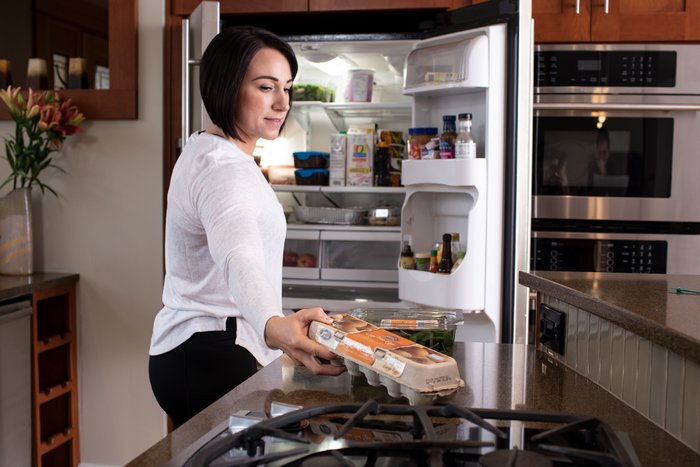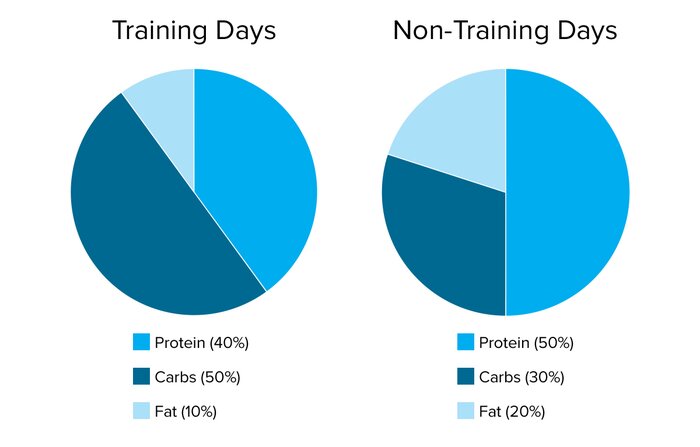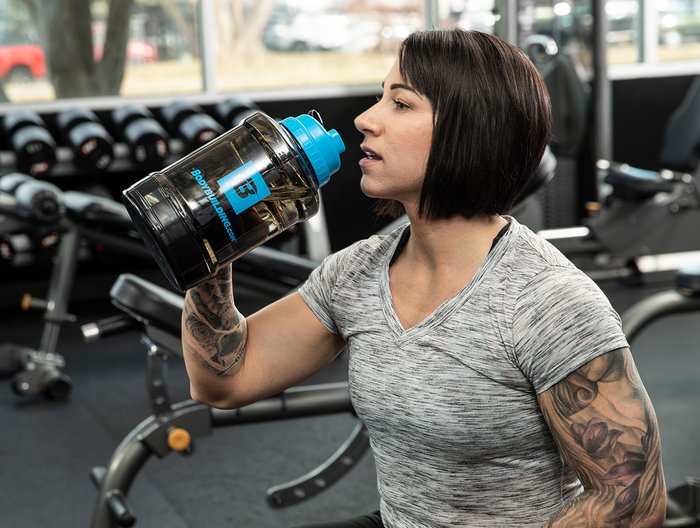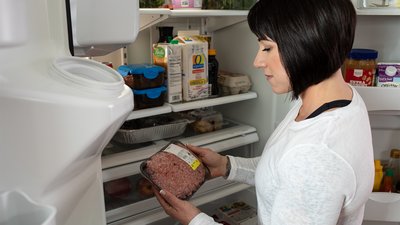Powerlifting for Beginners | Nutrition for Powerlifters | Powerlifting vs. Bodybuilding | Powerlifting Training for Women | Powerlifting Meet Prep | Advanced Powerlifter Pro Tips | Essential Powerlifting Gear
Over the past few years, the old powerlifter mentality of "weight moves weight" has started shifting. Look at many of the current top lifters and you'll see they're leaner and more muscular than ever.
"Before, the goal was to get as big as possible, as fast as possible, and at any cost, with little regard to quality and content. But over time, more people have become educated on nutrition, and we know this isn't the best route," says all-time great powerlifter Laura Phelps, who now coaches up and coming lifters.
Looking to be strong while keeping a healthy body composition? Then here's how to prioritize your powerlifting diet.
1. Calculate the Right Amount of Carbs for You
The first question many competitive lifters tend to ask is, "How much protein do I need?" But the answer to that is usually pretty simple: somewhere around 1 gram per pound of body weight, maybe a bit more or less. Where they should probably be focusing on dialing things more precisely is with carbohydrates, which athletes tend to take to extremes: either way too low, or way too high.

"Carbohydrates are key players in both brain function, muscle growth, and muscle contraction—I don't think going super low-carb is the answer for powerlifters," Phelps says. "To perform optimally during intense anaerobic lifting workouts, eating sufficient amounts of quality carbs is crucial. But during training phases with longer rest periods between sets, super high levels of carbs are not really necessary."
These are the standards that registered dietician and competitive powerlifter Paul Salter aims for: For training days, carbs should make up 50 percent of your daily calories, or around 1.8 grams per pound of body weight. For non-training days, dial that back to 30 percent of calories, or around 1.2 grams per pound of body weight. This is right in line with his recommended approach for strongman athletes, too.

Do your workouts tend to go over the 90-minute mark, or even close to 2 hours? Then consider adding some intra-workout carbs. This could be in the form of a drink, or it could be a snack like a protein rice crispy treat, a favorite of powerlifter Meg Squats, creator of the popular Uplifted strength and muscle training plan.
A note: If you're making these as an intra-workout treat, skip the peanut butter, which slows down digestion.
2. Avoid Critical Mistakes on Competition Day
Many powerlifters treat meets like an endurance event, loading up on carbs by the armful. But, meet day is really a series of three sprints, not a marathon.
"You're not continuously exercising," Salter says. "So, you don't need high amounts of slow-digesting carbs for sustained energy. Instead, eat moderate amounts of lower-fiber foods that digest quickly and won't feel heavy. Think rice cakes, granola bars, pretzels, or even cereals."
From soft and chewy protein cookies to crisp and satisfying protein chips, we've got your meet-day needs covered!
Phelps knows from experience how helpful this advice can be. "I was one of those lifters who didn't do well with heavy foods, so my go-to snacks were rice cakes, baby food packets, bananas, peanut butter and jelly sandwiches, and carbohydrate drinks," she says.
If your federation does two-hour weigh-ins, Salter recommends a protein shake and a carb-rich sports drink right after. This is easy to digest, provides a good number of calories, and helps with hydration. If you have the luxury of a 24-hour weigh-in, eat as normal, focusing on whole, nutrient-dense foods.
Both Salter and Phelps also agree that meet day is not the time to try new foods. Nothing you eat is worth potentially affecting your performance on the platform.
Protein is your friend both during prep and on meet day.
3. Don't Forget About Water and Sodium
Ever been adequately fed and slept a solid 7-8 hours, but your lifts still felt like crap? The problem might be your water intake.
"Hydration is critical for anaerobic performance and recovery. Muscles contract faster when properly hydrated and have balanced calcium, potassium, and sodium levels—and you need muscles to contract fast when you're doing heavy singles near your one-rep max," says Phelps. "The good news is that much of your electrolyte balance can be controlled through food and water intake."

Also, try to take the "salt is bad for you" mantra with, well, a grain of salt. Pushing a low-sodium diet is usually a retaliation against the added sodium in processed foods. In the case of performance, however, adding salt to your food is fine—helpful, even. Salter suggests lightly salting all of your meals during heavy training phases.
Not sure if you're hydrated enough? Track your water intake for a few weeks. You may be drinking less than you think!
*BCAAs, electrolytes, and more to promote recovery, endurance, and hydration. These items are perfect for endurance athletes or outdoor training.**
4. Eat with Your Workouts in Mind
There's no universal "right" way to eat, or one-size-fits-all macronutrient ratio. But the harder you train, the more when you eat could make a huge difference in your performance.
"Keeping your personal macro profile in mind, center your carbs around your workouts: 20-30 percent of your daily carbs before for glycogen stores and sustained energy throughout, and 25-35 percent of them after your workout to replenish them," Phelps advises.
Both Phelps and Salter like to spread the total calories for powerlifters across a minimum of three meals per day, and a maximum of five—or maybe three meals and two snacks. Any more than that, and you'll struggle to plan and prep your meals. Any less, and you'll struggle to eat enough in a sitting and could feel bloated and awful.
Eat Like an Athlete
While all this information is vital for powerlifters, it can be applied to almost any strength athlete or lifter. "If you view yourself as an athlete, invest in your nutrition knowledge and learn the foundational ideas of fitness nutrition," Salter says. "Find the right resources to set up a plan, and then prioritize having enough fuel before, during, and after workouts."
Be smart with your food choices, do your research, and lift heavy—and then heavier!

